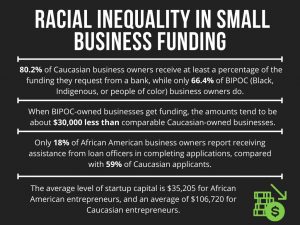Here’s an interesting statistic: while around 37% of all small business owners use their own cash to start their venture, around 44% of African American small business owners say they started their businesses with their own cash. But now, get this: according to the most recent census data, African Americans own 2.2% of the 5.7 million businesses with employees in the U.S., and according to the U.S. Chamber of Commerce, African Americans make up 9.4% of business owners (despite making up more than 12% of the U.S. labor force) in the U.S. Do those numbers seem a little, well, off to you? They should – so let’s take a look at why things are so skewed when it comes to funding small businesses, and how African American entrepreneurs can seize opportunities from larger organizations, and help level the playing field.
African American-Owned Small Business Funding by the Numbers
So why are so many more African American small business owners self-funding than other business owners? Unfortunately, it’s probably because the racial funding gap is very real. Federal Reserve numbers show that:
- 80.2% of Caucasian business owners receive at least a percentage of the funding they request from a bank, while only 66.4% of BIPOC (Black, Indigenous, or people of color) business owners can say the same.
- When BIPOC-owned businesses do get funding, the amounts tend to be about $30,000 less than comparable Caucasian-owned businesses.
- Just 1% of African American business owners obtain business loans in their first year, but 7% of Caucasian-owned organizations get business loans in their first year.
- Only 18% of African American business owners report receiving assistance from loan officers in completing applications, compared with 59% of Caucasian applicants.
- 37.9% of African American business owners say they feel “discouraged” from applying for loans.
- The average level of startup capital is $35,205 for African American entrepreneurs, and an average of $106,720 for Caucasian entrepreneurs.
- African American entrepreneurs are around three times as likely to have growth and profitability hindered by a lack of financial capital.
All of the above does sound discouraging, especially since Citigroup recently put out a report showing that the cost of systemic racism to the U.S. economy over the last 20 years has been around $16 trillion, with $13 trillion of it being attributed to failure to equitably invest in African American entrepreneurs. But fortunately, big corporations and venture capitalists are finally sitting up and taking notice of the damaging inequality all around us, and are beginning to lend a hand.
A Real Return on Investment Opportunity
According to Melissa Bradley, founder and managing partner at 1863 Ventures, a Washington, D.C.-based business-development nonprofit that works with historically marginalized entrepreneurs, “…an amazing amount of corporate commitments [have] now also [been] focused on Black and brown founders, which I think has been amazing. There was over $66 billion committed by Fortune 1000 companies toward racial-justice initiatives. And so I think a combination of COVID-19 and the death of George Floyd, unfortunately, have triggered people to reorient what’s important to them, and to unlock capital to recognize that there’s real [return on investment] opportunity in these communities that have been historically overlooked and underserved.”
What Bradley is talking about is a whole host of companies and venture capitalists that have begun initiatives over the last few years or so, focused on lifting up African American businesses and communities. Let’s take a look at a few of them:
Goldman Sachs
The firm launched an initiative in March of 2021 called “One Million Black Women,” pledging $10 billion over 10 years to advance racial equity and economic opportunity for African American women. The initiative was set to focus on areas such as access to capital, job creation, financial health and workforce advancement; the bank also pledged to invest $100 million in philanthropic capital over the next 10 years. The targeted funding will take the form of direct investing, as well as grants.
Goldman Sachs noted that reducing the earnings gap for African American women could create up to 1.7 million jobs and add as much as $450 billion to the U.S. GDP annually.
Target
In April of 2021, discount retailer Target said it was rolling out a $2 billion dollar plan to support African American-owned businesses by 2025 by adding new brands to its shelves, hiring African American-owned construction or advertising firms and suppliers, as well as launching a new program for start-ups. This new program, called Forward Founders, was created to work with early-stage start-ups led by African American entrepreneurs to help them develop, test, and scale products to sell at mass retailers like Target. The company and its foundation are also giving $10 million to nonprofit organizations focused on addressing barriers for African American communities.
Netflix

In 2020, streaming platform Netflix announced that it would shift some of its $5 billion in cash to financial institutions that focus on African American communities. The company said they would bank up to 2% of its holdings, or about $100 million, with such lenders, starting with $35 million, split two ways: financing a new fund, the Black Economic Development Initiative, that will invest in African American financial institutions, and banking with the Hope Credit Union, an African-American owned institution.
According to Bill Bynum, Hope’s C.E.O, the money will have “a tremendous impact” in African American communities: “Pound for pound, no entity has a bigger impact” than a community lender, he said, pointing to a greater ability to lend to small businesses.
In December of 2021, Netflix announced that they had achieved their goal.
Lowe’s
In June of 2020, Lowe’s, the home improvement superstore, opened its first round of grant applications for $25 million in small business grants for minority-owned businesses. These grants were meant to provide emergency assistance during the pandemic, but C.E.O. Marvin Ellison, one of only four African American C.E.Os of a Fortune 500 company, said the grants would be the first step in a $50 million effort to support African American communities.
PepsiCo
The snacks and soft drink giant has said it plans to invest more than $400 million over five years to “lift up Black communities and increase Black representation at PepsiCo, specifically in leadership roles,” according to a statement. The company also committed to invest $50 million over five years to strengthen local African American-owned businesses, and plans to more than double spending with African American-owned suppliers and expand its supplier pipeline.
Its latest initiative is the “Dig In” platform, and “Dig In Day,” during which the corporation called on people to dine in or order from their African American-owned restaurant of choice, then upload their receipts to the dedicated Dig In Passport site, where they could explore African American-owned restaurants and show support. They hope to generate $100 million in sales for African American-owned restaurants over the next five years: “The impact we want to have is to grow this restaurant community by $100 million, that’s the commitment and things like the database of Black-owned restaurants is going to be super helpful because it will allows us to connect those restaurants and connect others to help them,” according to Scott Finlow, CMO at PepsiCo Global Foodservice.
Other Resources
The above are just a few of the corporations that have pledged support for African-American entrepreneurs and African American-owned businesses, and other types of firms and government-related agencies are also getting in on the action. For example, African-American business owners looking for help with funding can look into:
- Founders First Capital Partners – This investment firm based in San Diego has launched a “Racial and Social Economic Equality Initiative,” designed to offer financial assistance for businesses led by underserved and underrepresented entrepreneurs. Under the Founders First program, entrepreneurs pay up to 6.5% of their revenue for up to three years, for an investment that will average $250,000 but could go up to $1 million. Because repayments are tied to revenue, those payments will decline if revenue drops, unlike payments on a fixed loan.
- Kapor Capital – This Oakland-based venture capital firm’s current portfolio has 59% of its investments going to companies with “a founder who identifies as a woman and/or an underrepresented person of color.”

- Humble Ventures – This venture development firm provides consulting to diverse tech startups to help them grow and find funding.
- Harlem Capital Partners – New York City-based Harlem Capital Partners debuted its $40 million diversity-focused venture capital fund in December 2019 with a goal of helping to invest in minority and women founders around the United States.
- The Minority Business Development Agency (MBDA) – This agency of the U.S. Department of Commerce works to promote the growth of minority-owned businesses by doing such things as providing resources about grants and loans.
- The Community Development Financial Institutions (CDFI) Fund – According to the U.S. Chamber of Commerce, these institutions are Part of the U.S. Treasury Department, and “specifically provide loans, investments, financial services, and technical assistance to underserved populations and communities. On top of this, the CDFI Fund offers tax credits to spur investment. Business owners can search for local financial institutions that have received money from the CDFI Fund and that, in turn, should be able to provide tailored assistance.”
All of this is a great start for turning the tide when it comes to the racial inequity of small business funding in this country, but we all know there’s more to do to change the systemic issues that still plague us. These initiatives are helping, though, as well as helping to highlight the need to support African American entrepreneurs. As Larry Ivory, chairman of the National Black Chamber of Commerce, points out: “I think that there’s been a light shining on the United States in terms of the disparity treatment of African Americans that is systematic, the economic lack of opportunity that exists, that creates the environment that we’re in today. I think America has to have a very serious conversation and take a look at its own history.”
For now, if you’re an African American small business owner, or an aspiring entrepreneur, take advantage of any funding out there to support you! And we want to know: have you used any new resources or initiatives to help fund your small business?